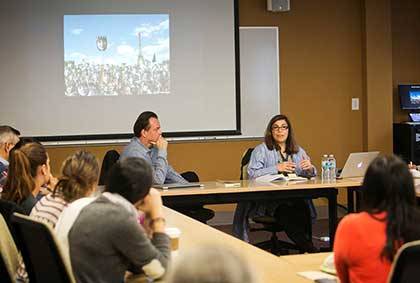
When news broke of the recent terrorist attacks in Paris, Duke engineer Mark Emamian turned immediately to Facebook to check on his daughter, a UNC-Chapel Hill student. “Our daughter Lily is in Paris,” said Emamian, who works in the Duke physics department. “Immediately after the attack she said on Facebook ‘Yes, I’m safe.’” Emamian’s experience is one example of the fast-moving, sometimes very personal ways social media now connects people around the world when tragedy strikes. The rapidly shifting role of social media in such crisis moments was the focus of a Tuesday discussion organized by the Duke Forum for Scholars and Publics, “The Beirut and Paris Attacks and Social Media: A Conversation.” Just after the Paris bombings, images of the French tricolor flag bloomed across the Internet as users posted pictures in grief and solidarity with the victims, noted panelists Laurent Dubois and Negar Mottahedeh.But social media is also a contentious space where debates about interpretation can move almost as quickly as events themselves, said Dubois, a Duke professor of romance studies and history who studies sport, race and immigration in contemporary France.“The war over interpretation of events starts to happen quickly,” Dubois said. “That’s one feature of social media. “The event is quickly followed by the question of how the narrative will be framed.”No sooner had memes of the French flag multiplied across Facebook and Twitter feeds than messages began appearing criticizing the lack of a similar outpouring of grief following recent bombings in Beirut, Dubois and Mottahedeh said.One student in Tuesday’s audience said that for her, it was painful to compare the two responses.“I have hundreds of Palestinian friends,” the student said. “They feel a double grief. They grieve for the Paris victims. But they also feel their grief doesn’t count.”Even as some social media users compared response to the two events, still others urged a halt to “grief-shaming,” noted Mottahedeh, a Duke associate professor who studies Middle Eastern culture, cinema and political movements. Mottahedeh pointed out that social media is itself a morally neutral tool -- despite sometimes naïve claims to the contrary. “It’s a technology that aids both good and evil,” Mottahedeh said. “It has both the ability to bring people together and to conduct surveillance of people.”Mottahedeh writes about the role social media played in Iranian protest movements in her recent book “#Iranelection: Hashtag Solidarity and the Transformation of Online Life.” She called for social media users to take those platforms more seriously by taking greater responsibility for their online behavior.“Social media is a whole new ecology and we’re building it together,” Mottahedeh said. “We need to be aware that all of our clicks and shares and check-ins -- they all affect the way these platforms take shape and move forward.”Mottahedeh also argued that the wide-open world of social media needs rules to encourage responsible behavior. Any gathering of human beings has rules of conduct -- even families, she said. The social media landscape should be no different. “There needs to be a system of government and laws that allow us to coexist in this space,” she said. “This is something we can’t leave to happenstance.”